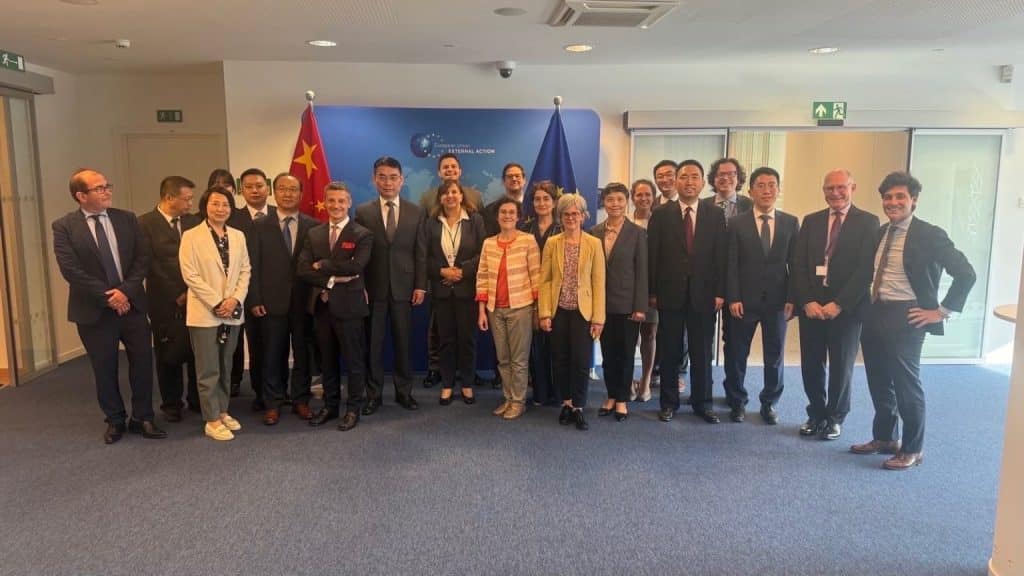

On the occasion of the 40th EU-China Human Rights Dialogue, held on 13 June in Brussels, the European Union has reaffirmed that the selection of religious leaders should happen without government interference and in accordance with religious norms – including for the succession of the Dalai Lama. The EU also demanded that China provides “transparent and reliable information” about the 11th Panchen Lama, who has been missing for 30 years.
Vincent Metten, EU Policy Director at the International Campaign for Tibet (ICT), stated: “We welcome the EU’s clear position on the Dalai Lama’s succession and the Panchen Lama. Now, the EU must move from words to action by ensuring that Chinese officials involved in such religious interference are considered for listing under the EU’s Global Human Rights Sanctions Regime.”
This renewed stance from the EU comes just weeks before the 90th birthday of His Holiness the 14th Dalai Lama, on 6 July 2025 – a moment that should be one of celebration for Tibetans and Buddhists worldwide. Yet inside Tibet, as documented in a new ICT report, even publicly acknowledging the Dalai Lama’s birthday remains a dangerous act. Tibetans have been detained, harassed, and imprisoned simply for possessing his image or organizing prayer ceremonies in his honor.
At the dialogue, the EU also raised the cases of several Tibetan writers, monks, and activists arbitrarily detained by China, including Go Sherab Gyatso, Tashi Dorje Anya Sengra, Tsongon Tsering, Drugdra, Lobsang Khedrub and Lobsang Gephel. Their imprisonment reflects China’s broader campaign to silence Tibetan voices and suppress religious, linguistic, and cultural expression.
In addition, the EU expressed concern over China’s increasingly frequent use of transnational repression tactics. This follows the death under suspicious circumstances of respected Tibetan lama Tulku Hungkar Dorje in Vietnam in March 2025 – an incident that ICT believes may be linked to Beijing’s growing efforts to monitor and pressure Tibetan communities overseas.
Beyond the Tibet context, the EU stated it used the dialogue to raise broader human rights violations across China. The EU highlighted the severe restrictions on freedom of expression, freedom of peaceful assembly and association, the continued use of arbitrary detention, surveillance of human rights defenders, and the repression of ethnic and religious minorities. The worsening trend under President Xi Jinping’s leadership reinforces the urgency for the EU to uphold a principled and unified response.
Following the EU field visit to Tibet as part of the 39th Human Rights Dialogue in June 2024, this year’s agenda also included a visit to South Tyrol, Italy. According to the EU, the visit to South Tyrol provided an opportunity for open exchanges on the protection of the rights of persons belonging to minorities and the preservation of cultural identity, including through multilingual education. South Tyrol is widely regarded as a successful model of genuine autonomy within a European framework, including in the field of education – an area where Tibetans currently face deep coercion and assimilation under Chinese state policies.
In May 2025, the European Parliament adopted a strong resolution that firmly opposed Chinese interference in the succession of the Dalai Lama and other Tibetan Buddhist leaders. It also condemned the coercive boarding school system imposed on Tibetan children, which systematically undermines Tibetan language, culture and identity. The resolution expressed strong support for the Middle Way Approach and called for the resumption of dialogue between Beijing and the representatives of the Dalai Lama.
At the end of July, the EU and China will hold their next Summit in China, marking the 50th anniversary of EU-China diplomatic relations. As the human rights situation continues to deteriorate across China, Tibet and East-Turkstan, the EU must ensure that these issues are placed at the top of the summit’s agenda. This includes raising the situation in Tibet, reaffirming the call for China not to interfere in the Dalai Lama’s succession, and urging Beijing to re-engage in meaningful dialogue with his representatives.
EU4TIBET is a campaign led jointly by the Tibet Interest Group of the European Parliament, the International Campaign for Tibet and the Office of Tibet Brussels, with the significant support of the International Tibet Network, Tibet Support Groups and Tibetan Communities in Europe.